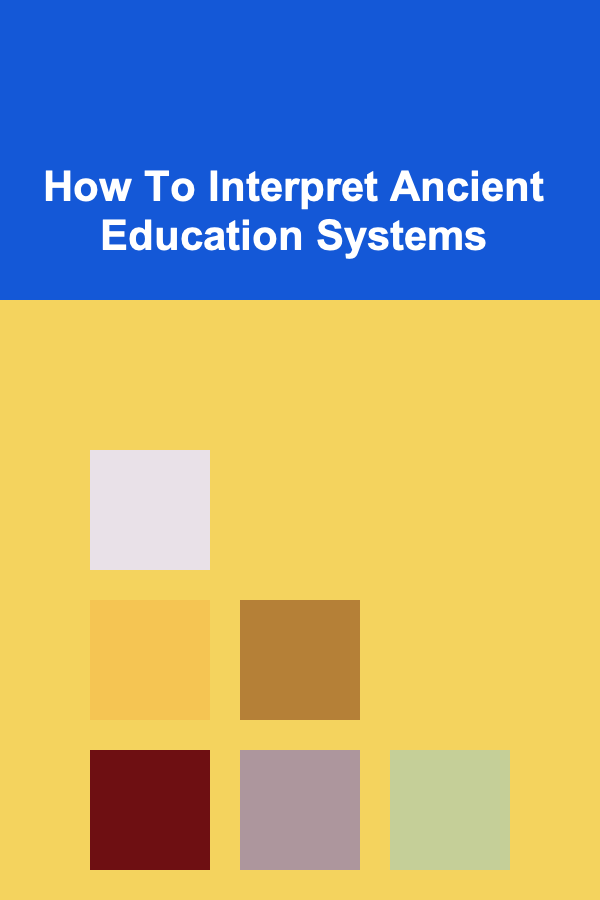
How To Interpret Ancient Education Systems
ebook include PDF & Audio bundle (Micro Guide)
$12.99$6.99
Limited Time Offer! Order within the next:

Education, in its essence, has always been a fundamental aspect of human civilization. From the ancient philosophers of Greece to the esteemed scholars in ancient China, the systems of learning in antiquity were diverse and complex. These early educational frameworks not only served the practical needs of their societies but also helped shape philosophical, religious, and cultural paradigms that have influenced modern education systems. Understanding and interpreting ancient education systems requires more than just a historical perspective; it demands a deep dive into the societal, political, and philosophical underpinnings of each civilization. This article will explore how to interpret ancient education systems, shedding light on their structures, values, and long-lasting impact.
The Role of Education in Ancient Societies
In ancient times, education was often seen as a privilege, reserved for those who held power, wealth, or social status. Unlike modern education systems, which typically emphasize accessibility and inclusivity, ancient education was tightly woven into the social fabric of the elite. Despite this exclusivity, education still played an essential role in shaping societal norms, values, and traditions. It influenced everything from governance and law to religion and science, often determining the trajectory of civilizations.
The key purpose of education in ancient times was not just the transmission of knowledge but the cultivation of character, wisdom, and virtue. In many cases, learning was a means to prepare the younger generation for leadership, religious duties, or intellectual pursuits.
Ancient Greece: Education as a Path to Wisdom
Ancient Greece provides one of the most influential models of education in the Western world. Greek educational systems were diverse, varying between city-states such as Athens and Sparta, but they all shared a common purpose: to produce individuals who would contribute to the well-being of society.
The Athenian Model: Holistic Development
In Athens, the education system was designed to cultivate well-rounded citizens. The core of Athenian education was the idea of paideia, which emphasized not just intellectual development but also physical and moral cultivation. Boys began their education around the age of seven and were trained in various fields, including grammar, rhetoric, music, and gymnastics. The ultimate goal was to produce citizens who were capable of participating in civic life and contributing to the democratic ideals of Athens.
Athenian education was highly focused on philosophy, as the teachings of Socrates, Plato, and Aristotle shaped the intellectual pursuits of the time. Philosophy, logic, ethics, and public speaking formed the backbone of Athenian education. The primary aim was not just to accumulate knowledge but to refine one's reasoning abilities and develop a moral and virtuous character. For the Athenians, education was the foundation for understanding the world, leading a just life, and fulfilling one's role in the democratic process.
The Spartan Model: Discipline and Military Training
Contrasting sharply with Athens, Sparta focused primarily on military training and discipline. The Spartan education system, known as the agoge, was designed to produce disciplined, skilled warriors who would contribute to Sparta's military dominance. Education in Sparta was state-controlled and was centered around strength, endurance, and obedience to authority.
Boys entered the agoge at the age of seven, where they were taught survival skills, combat techniques, and the Spartan code of ethics. Unlike Athenian education, which valued intellectual pursuits, Spartan education emphasized physical prowess, teamwork, and loyalty to the state. The agoge was harsh and rigorous, often involving physical punishment and deprivation. Spartan education was not about developing intellectual pursuits but about fostering qualities that would ensure the survival and strength of the Spartan state.
Ancient China: Confucianism and the Civil Service Examination
Ancient China's education system was deeply influenced by Confucian philosophy, which emphasized moral virtue, familial duty, and the importance of social harmony. Confucianism shaped China's educational ideals for over two millennia, placing great importance on the cultivation of moral character, respect for authority, and reverence for tradition.
The Role of Confucianism
Confucius, the great philosopher of the Eastern Zhou Dynasty, believed that education was essential for cultivating virtue and wisdom. He emphasized the importance of moral education, arguing that a ruler's success depended on the virtuous character of his subjects. Confucius' vision of education was centered around the idea of learning to be a better person and contributing to the harmony of society. Knowledge was not merely about intellectual achievement but was meant to help one become a moral and ethical individual.
Confucian education focused on the study of classic texts, which were seen as the foundation of Chinese culture. The Five Classics and Four Books were central to Confucian education, and students spent years memorizing and interpreting these texts. A well-rounded Confucian education included subjects like poetry, history, music, and the art of moral conduct.
The Civil Service Examination
One of the most unique aspects of Chinese education was the civil service examination system, which was established during the Tang Dynasty (618--907 AD) and became formalized during the Song Dynasty (960--1279 AD). The exams were designed to recruit talented individuals into government service based on merit, rather than aristocratic status or family connections.
The civil service exams were highly competitive and could only be passed by those who had mastered the Confucian classics and demonstrated exceptional literary skills. The exams became the primary means by which individuals could rise in society, and success in these exams was a reflection of one's education, discipline, and intellectual ability.
The civil service exam system played a significant role in shaping Chinese society by promoting a meritocratic approach to governance. It also reinforced the importance of Confucian values, as the exams were largely focused on testing one's understanding of Confucian philosophy and classical Chinese literature.
Ancient Egypt: Knowledge for the Priesthood and Royalty
In ancient Egypt, education was largely reserved for the elite, particularly the priesthood and the royal family. Education in ancient Egypt was focused on preparing individuals for roles in governance, religion, and the administration of the state.
The Role of Priests
The priesthood played a central role in Egyptian education, as they were the primary custodians of knowledge, particularly in religious, astronomical, and medical fields. Priests were responsible for the maintenance of sacred texts, the observation of religious rituals, and the study of the heavens. Education was highly specialized, with students receiving training in specific subjects related to their roles in society. Knowledge was seen as a sacred tool, and the ability to read and write hieroglyphs was an esteemed skill.
Royal Education
Royal education in Egypt focused on preparing future pharaohs for leadership. Princes and other royal offspring were educated by scribes and priests who taught them how to govern, understand religious ceremonies, and manage the vast Egyptian empire. Royal education also included training in military strategy, law, and diplomacy. The role of a pharaoh was considered divinely appointed, and education aimed at nurturing a ruler's wisdom, strength, and virtue.
Ancient India: The Gurukul System and Spiritual Education
Ancient India offered a distinct approach to education through the gurukul system, which was deeply tied to the spiritual and philosophical traditions of Hinduism, Buddhism, and Jainism. Education in ancient India was seen as a means of attaining spiritual enlightenment, moral development, and intellectual mastery.
The Gurukul System
The gurukul was a traditional educational system in which students, or shishyas , would live with a guru (teacher) in a secluded setting. The system emphasized individualized instruction, and students were taught various subjects, including Vedic texts, mathematics, astronomy, and philosophy. Education was not just academic but also spiritual and focused on the holistic development of the student.
The gurukul system was based on the idea of imparting wisdom, rather than simply transmitting knowledge. Students were expected to learn through dialogue, personal experience, and spiritual practice. Education was seen as a lifelong journey, and teachers were regarded as guides to both knowledge and self-realization.
Philosophical and Religious Education
Education in ancient India was closely linked to religious and philosophical teachings. The Vedas, which are the oldest sacred texts of Hinduism, were the foundation of education, and much of the learning was centered around these texts. Similarly, Buddhism and Jainism also had educational systems based on their respective religious philosophies. These systems aimed to cultivate a deep understanding of the universe and human nature, encouraging students to pursue enlightenment and liberation from suffering.
Interpreting Ancient Education Systems: A Modern Perspective
Understanding ancient education systems offers profound insights into the values, priorities, and beliefs of ancient civilizations. While these systems were often hierarchical and elitist, they were also rich with ideals that transcended time and continue to resonate today. Ancient education systems were not only about transmitting practical knowledge but were also deeply connected to the spiritual, moral, and intellectual fabric of society.
When interpreting these systems, it is essential to recognize that they were designed for very specific purposes---whether to serve the state, foster virtue, or promote religious or philosophical ideals. In some cases, the systems reflected the prevailing political structure, such as the military-focused education in Sparta or the merit-based system in ancient China. In other cases, education was more focused on the development of moral character, such as in Athens or India.
Furthermore, ancient education systems provide valuable lessons for modern education. They remind us that education is not just about intellectual achievement but also about personal development, community service, and societal responsibility. They highlight the importance of cultivating wisdom, ethical conduct, and critical thinking---values that continue to be relevant in today's rapidly changing world.
By studying these ancient systems, we gain a deeper understanding of the roots of education and its enduring role in shaping humanity's progress. The wisdom of the ancients can still guide us as we continue to refine our own educational systems in the pursuit of knowledge, virtue, and societal well-being.
Reading More From Our Other Websites
- [Organization Tip 101] How to Organize Yarn by Color and Weight
- [Star Gazing Tip 101] Star-Crossed Getaways: Combining Cozy Cabins and Night Sky Wonders for Romance
- [Screen Printing Tip 101] How to Design and Print QR‑Code Embedded Artwork for Interactive Apparel
- [Home Renovating 101] How to Create a Renovation Budget That Works
- [Organization Tip 101] How to Keep Craft Kits for Different Projects Separate
- [Sewing Tip 101] How to Design and Sew a Convertible Backpack‑to‑Tote Bag
- [Personal Care Tips 101] How to Find Affordable Drugstore Skincare That Works
- [Home Space Saving 101] How to Design a Space-Saving Laundry Area in a Small Apartment
- [Home Rental Property 101] How to Create a Pet Policy for Your Rental Property That Works
- [Home Lighting 101] How to Light Outdoor Spaces with Solar Power: A Comprehensive Guide

Building Your Personal Brand for Remote Job Search Success
Read More
How to Organize Travel Guides and Maps in Your Library
Read More
How To Understand Quantum Annealing
Read More
How To Reduce Your Risk of Vision Loss
Read More
How to Decorate Cookies with Royal Icing
Read More
How to Navigate Healthcare Compliance Regulations
Read MoreOther Products

Building Your Personal Brand for Remote Job Search Success
Read More
How to Organize Travel Guides and Maps in Your Library
Read More
How To Understand Quantum Annealing
Read More
How To Reduce Your Risk of Vision Loss
Read More
How to Decorate Cookies with Royal Icing
Read More